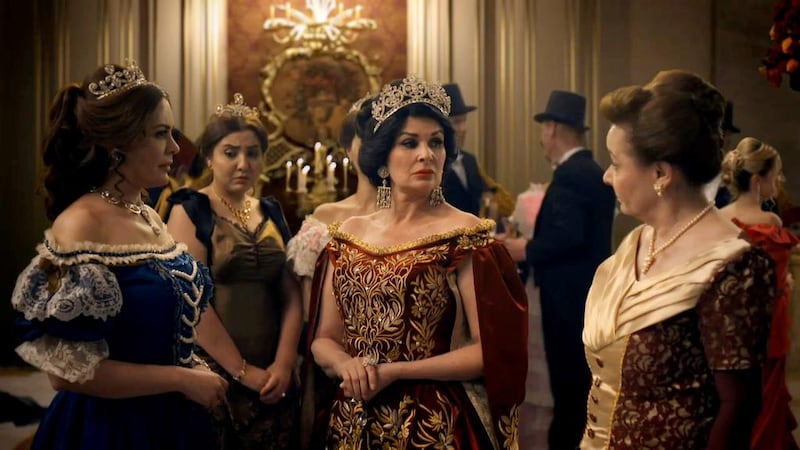“Let them eat cake” is the line popularly attributed to Marie Antoinette, who was accused of being oblivious to the problems of the poor outside her palace walls.
Long dismissed by historians as something the Queen of France is unlikely to ever have said, the phrase has nevertheless fixed her forever in the public imagination as someone insensitive to the needs of “real people”.
Now, thanks to this year's biggest TV hit, the historical drama series Saraya Abdeen, a different queen has taken over the popular imagination. The show has sparked comments on social media about Queen Khoshyar, the mother of Khedive of Egypt and Sudan, also known as Ismail Pasha and Ismail the Magnificent, who ruled in the 19th century. For this generation, she will forever be associated with the actress who plays her, the Egyptian star Yusra.
Based on the life and court of Khedive Ismail Pasha (played by Syrian actor Qessi Khawli), the show made its debut during Ramadan. As the Arab world plunges into further conflict and overwhelming tragedy, historical dramas on the ancient past, as well as modern palace intrigue, have succeeded in capturing an audience in need of escape.
The women in the show are swathed in dresses of silk and velvet and loaded with precious gems and live inside a palace surrounded by magnificent gardens. With a wave of the hand, servants scramble, guests bow and the inner circle poison, kidnap and plot.
How accurately figures of history are being portrayed remains a point of contention, but accuracy, or lack of it, doesn’t seem to bother the viewers.
“Yok to terrorism. Yok to violence”, was tweeted by fans of Queen Khoshyar with her photo, crowned and gowned, in effect allowing a historic figure to comment on the present crisis in the Middle East. The character speaks in an unfamiliar accent peppered with what are believed to be Turkish Albanian words that the real Queen may or may have not used.
“Yok” is a word she repeats in reference to anything she dislikes. It is unclear where the word originated. Some point to the similar-sounding English word “yuck”, while others debate whether the English word has its roots in Ottoman Turkish. Yok, according to Turkish fans, can mean no, not there or not available.
The series has also inspired Facebook pages and tweets dedicated to individual characters. The most dramatic moments have launched jewellery and clothing lines based on those of the characters.
“I love watching this series as well as Hareem Al Sultan,” says Maha Abdullah, a 32-year-old Emirati from Dubai.
“It gives us a break from our stressful and less-glamorous daily life,” says the engineer. “I have such a crush on the Al Khedive, he is so handsome, charming and strong.”
The Arab production is said to have been inspired by the popular Turkish historical drama Hareem Al Sultan, or The Magnificent Century. It premiered in 2011, dubbed in the Syrian Arabic dialect, and remains popular. This drama chronicles the life of the 16th-century sultan Suleiman the Magnificent, who ruled the Ottoman Empire in its golden age.
When it aired in Turkey, there were complaints about disrespect of an important historical figure by showing him drinking wine and spending time with his concubines.
The prime minister, Recep Tayyip Erdogan, said it was “an attempt to insult our past”.
Saraya Abdeen received its own share of criticism by members of the same royal dynasty. King Ahmed Fouad II, the last king of Egypt before the 1952 revolution that ended the monarchy, said the series is a “historical farce”.
The appeal of these dramas doesn’t surprise Dr Habib Ghaloom Al Attar, the Emirati artist, actor and author, and also the Director of Culture at the Ministry of Culture, Youth and Community Development.
“They take the viewer away from social issues and problems they experience in their lives,” he says. “Marriage, debts, drugs, jealousy, divorces and betrayal, killing and fighting, these are things that a viewer doesn’t necessarily want to be reminded of. They want nostalgia, heroes, drama on a grand scale and if there are princes and princesses involved, what is more romantic and dreamy than that?”
Al Attar says it takes a lot to move and attract an Arab audience.
“That is why faraway places and time periods are ideal,” he says. “You can bring up important issues through the past that you can’t bring up and critique as openly in the present.”
Asked if he would like to play a royal figure, Al Attar says he has been compared to the Saudi Prince and poet, Prince Khalid Al Faisal.
“I would love to play him. Who doesn’t want to be a prince?” he says.
Jokingly, he adds: “I am envious of Qessi, he is surrounded by beautiful women, all fighting for his attention. “What a great role to be in. We all want to be a Khedive now.”
rghazal@thenational.ae





